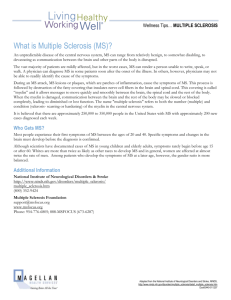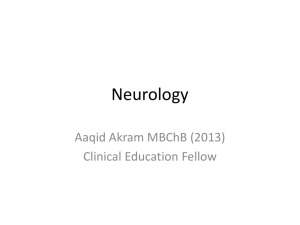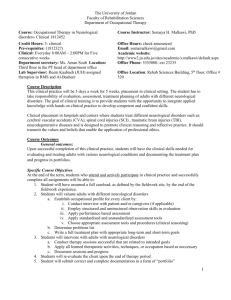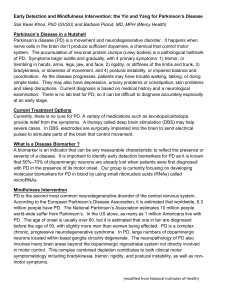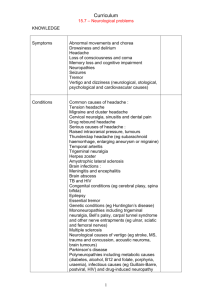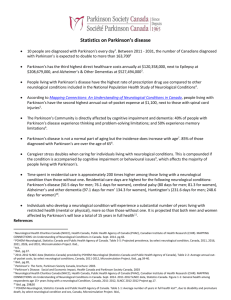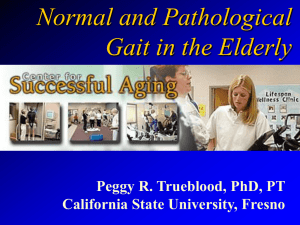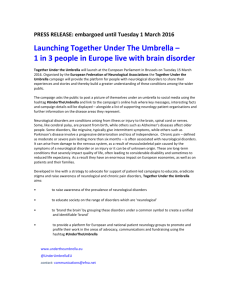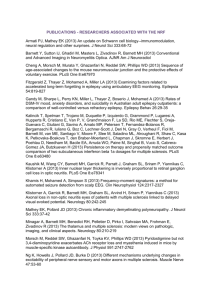Neuroepidemiology
advertisement
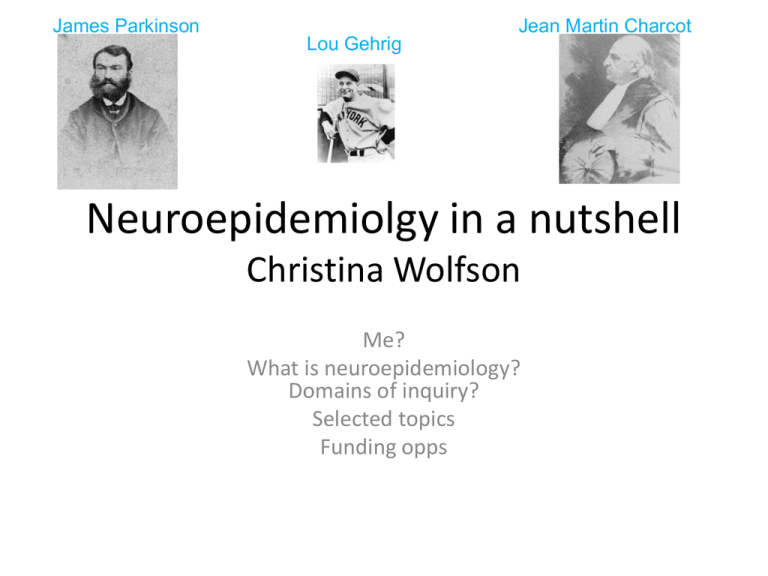
James Parkinson Jean Martin Charcot Lou Gehrig Neuroepidemiolgy in a nutshell Christina Wolfson Me? What is neuroepidemiology? Domains of inquiry? Selected topics Funding opps Me? • MSc in Mathematical Statistics – “Measures of agreement for quantitative data” • PhD in Epidemiology and Biostatistics – “Probabilistic models for the natural history of Multiple Sclerosis” • Neurodegenerative diseases and aging • Director of the Neuroepidemiology Research Unit (RI MUHC) Neuroepidemiology • Simply – that branch of epi dealing with the study of neurological disease • Term coined by Milton Alter, Len Kurland and John Kurtzke in 1967 • Journal NEUROEPIDEMIOLOGY (founded in 1982) • VERY few neuroepidemiologists in Canada • People doing research in neuro diseases in EBOH – Myself, R Fuhrer, N Mayo, E Strumpf, J McCusker, B. Richards – there are most definitely others What? • Epidemiology of Neurodegenerative disorders – Distribution – Identification – Determinants/Etiology • Prevention – Design – Prognosis • Natural history • Treatment • • • • • • • • • Multiple Sclerosis Amyotrophic Lateral Sclerosis Parkinson’s Disease Alzheimer’s disease Epilepsy Stroke Cerebral Palsy Creutzfeldt Jakob Disease ........... With whom? Neurologists, Neuropsychologists, Economists, Statisticians, Physiotherapists, Nutritionists, Family Docs, Sociologists, Ethicists, Lawyers, Engineers, Kinesiologists, Clinical biochemists, Immunologists, Virologists, Geneticists, ...... How? Whatever is needed! • • • • • • Case control Cohort Case crossover Clinical Trial Prevalence Statistical methods • Capture recapture • Markov/semi Markov models • Disease mapping methods Spill over into research in aging • Systematic reviews • Databases/registries • Face to face interviews • Structured • Qualitative • Telephone interviews • Self administered questionnaires • Physical assessments • Biological samples • Focus Groups • Harmonization Some pending questions • What is the prevalence of – MS in Canada? – ALS in Canada? – Parkinson’s disease in Canada? – Epilepsy in Canada? • Is the incidence of MS really increasing in women but not in men? If so, why and what etiological clues might it provide? Could such an observation be due to bias? • Is the incidence of ALS really increased in deployed Gulf War Veterans? How can we study such a rare disease? What is the optimal comparison group? • What do we know about survival with neurological disorders? Has survival with MS increased over the past 50 years? • • Are sleep disorders early signs of Parkinson’s disease? Are olfactory makers early signs of neurodegenerative diseases? (Sniff test!) • Controversial area: Is Chronic Cerebrospinal Venous Insufficiency (CCSVI) a cause of MS? A consequence of MS? Does the “liberation” procedure to improve cerebral blood flow have any value? Some Methods Questions • How do we identify neurological conditions in population based studies without a full neuro assessment? • Validation of disease ascertainment algorithms in epi studies • Has the presence of length bias in prevalent cohorts with follow up resulted in biased estimation of survival with neurological disorders? • See article in JCE 2012 • What is the best tool to identify cognitive impairment in a population based study? • • How do we identify participants who do not have the capacity to consent to research? What do we do when we identify them? • What are our best strategies to conduct risk factor studies on ALS, a rare, rapidly fatal disease? Selected Projects • International case control study of MS risk factors (Norway, Italy, Sweden, Serbia, and Canada) • 4,000 cases – 16,000 controls • Physician preferences for the care of individuals with MS – do GPs see MS patients? • Provincial survey of neurologists, ophthalmologists and GPs. • The Epidemiology & Impact of Comorbidity on Multiple Sclerosis in Canada • Systematic review of incidence and prevalence of MS worldwide continued • Transition of Care for Adolescents with Neurological Disorders • Program in Epidemiology Targeting Amyotrophic Lateral Sclerosis (PETALS) • Validation of diagnostic algorithms for Parkinson’s disease, epilepsy for use in population based studies • Canadian Longitudinal Study on Aging – Neurological Conditions Initiative Selected Trainee Topics in Neuroepi completed and ongoing • MSc (EBOH and Math/Stat) – Misclassified exposure to infectious agents in case-control studies of MS – impact on Odds Ratios – Measures of change in cognition in Alzheimer’s Disease – Seasonal variation in Parkinson’s disease risk – Successful health care transition in young adults with chronic neurological disorders – Methods to study the natural history of MS (Math/Stat) – A new capture-recapture model selection criteria with an application to MS (Math/Stat) – Validity of the Markov assumption in economic studies of AD medications (Math/Stat) – Active/passive smoking as risk factors for MS – Validation of an epilepsy algorithm in a population based study • PhD students (EBOH) – Spatial statistics & their application to neuroimaging studies of MS patients (Biostatistics) – Fully Bayesian mapping models to identify high risk areas with an application to MS in Sardinia (Biostatistics) – Physican & caregiver preferences for treatment options in AD (EBOH) – Developing a tool kit of epidemiological resources for etiological research in pediatric MS (EBOH) Selected Postdoc projects • Postdocs – Mental incapacity & long term participation in observational research – Satisfaction with assistive technologies in MS – Delirium in elderly post surgical patients – Sleep disturbances as a marker for Parkinson’s disease • Neurology residents/clinical fellows – Prevalence of MS in Canada – Epstein Barr Virus and MS – Quality of Life in MS – Prevalence of MS in the Middle East – Lead exposure and ALS – Canine Distemper Virus & MS – Surgical resection of brain tumours and survival Some of what is going on in Canada – In 2009 the NHCC Successfully lobbied the government to commit $15million to epidemiological research into neurological disorders • The Canadian Multiple Sclerosis Monitoring System (CMSMS) • The Canadian Longitudinal Study of Aging (Research Platform) – 50,000 participants • CIHR International Collaborative Research Strategy for Alzheimer's Disease Funding Opportunities • • Supervisor (of course!) McGill “Graduate and Fellowships and Awards” - GPS website • CIHR, FRSQ (check the individual réseau for studentships) , disease specific societies (MS, PD, ALS, Heart and Stroke, etc) • CIHR Neuroinflammation Training Grant (McGill- U de M – Laval consortium) www.neuroinflammation.com – • Multiple Sclerosis; Spinal Cord Injury; Neuropathic Pain; Schizophrenia; Mental Illness; Maternal Infections; Brain Ischemia; CNS Inflammation; Brain Tumours; Neurodegenerative Disease EndMS Research and Training Network www.endMSnetwork.ca – – – $20 million initiative to recruit, retain and train student/researchers interested in MS related research Annual summer school, SPRINT (Scholar Program for Researchers IN Training); undergraduate summer studentships Others (less well known) L'Oréal Canada For Women in Science Research Excellence Fellowships (Postdoc) Scottish Rite Charitable Foundation (may be discontinued –check the website) Research Institute – MUHC Studentships (matching funds from supervisor) Questions? christina.wolfson@mcgill.ca
